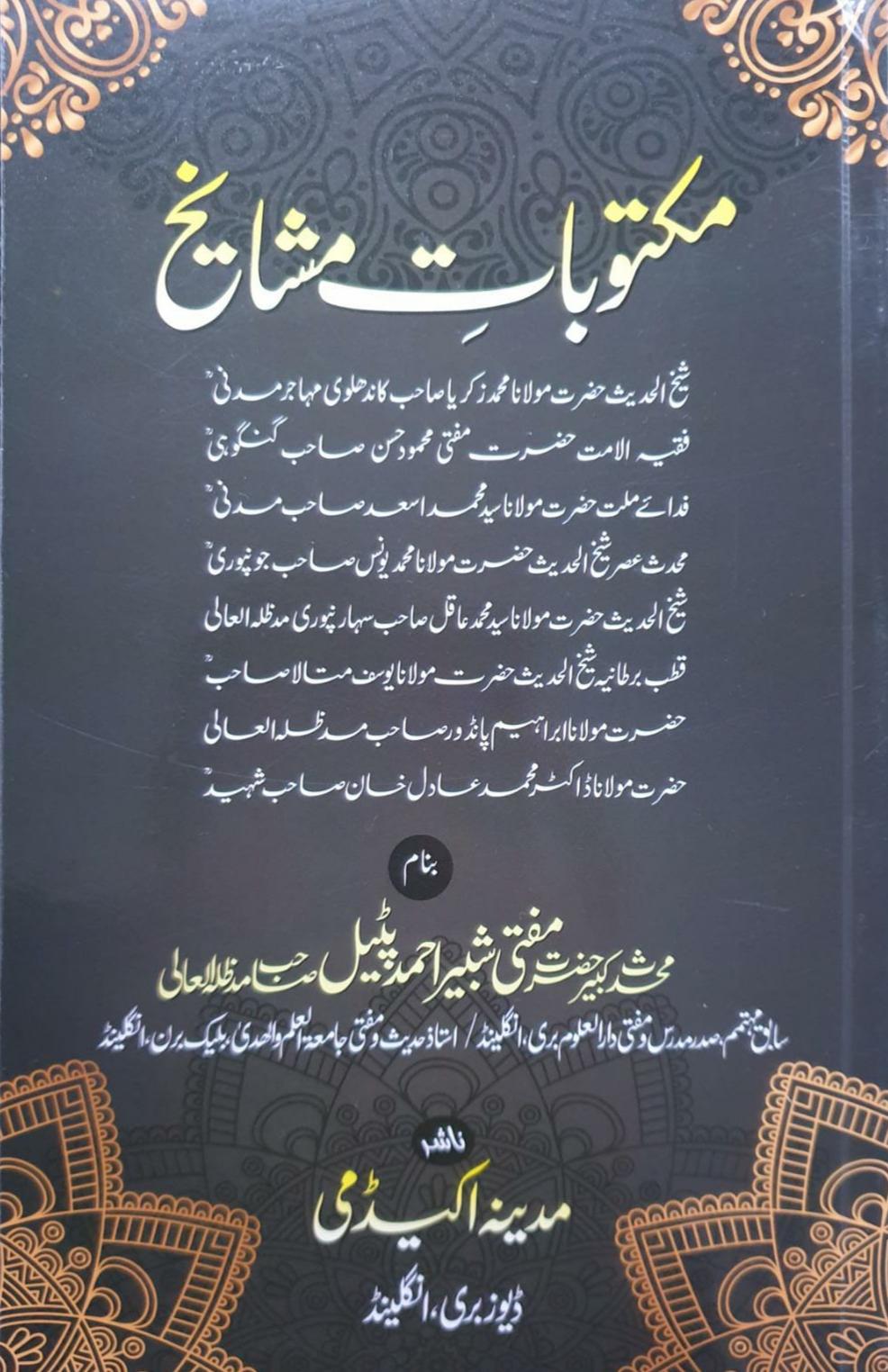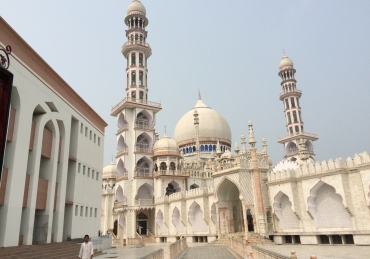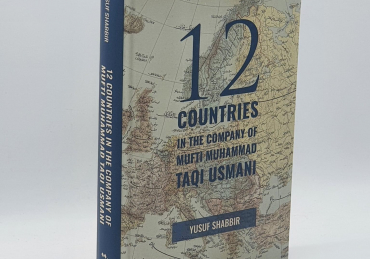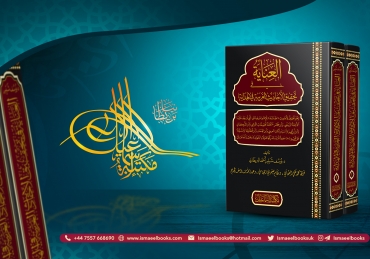Maktūbāt-e-Mashāyikh [New Book Release]
Madina Academy, Dewsbury in association with Islamic Portal is pleased to announce the publication of ‘Maktubat-e-Mashayikh’ (مکتوبات مشایخ) in Urdu. The book is now available to purchase from the following website: https://qurtubabooks.com/product/maktoobate-mashaikh/. All enquiries for purchase should be made to Qurtuba Books.
The book features the letters of various luminaries to Shaykh al-Hadith Mufti Shabbir Ahmad. The book comprises of the following:
- Introduction by Shaykh Yusuf Shabbir
- Foreword by Mufti Ahmad Khanpuri
- Foreword by Shaykh Masood Azizi Nadwi
- Preface by Shaykh Khalil Ahmad Kazi
- Profile and contributions of Mufti Shabbir Ahmad by Shaykh Khalil Ahmad Kazi
- 1 letter of Shaykh al-Hadith Mawlana Muhammad Zakariyya Kandhelwi
- 5 letters of Mufti Mahmood Hasan Gangohi
- 1 letter of Sayyid Mawlana Asad Madani
- 36 letters of Shaykh al-Hadith Mawlana Muhammad Yunus Jownpuri
- 1 letter of Sayyid Mawlana Aqil Saharanpuri
- 29 letters of Mawlana Yusuf Motala
- 5 letters of Mawlana Ebrahim Pandor
- 1 letter of Dr Mawlana Adil Khan Shahid
- 1 letter of Mawlana Aftab Alam Mirthi
The book has 215 pages and is soft back. To download sample pages of the book, click on the following link: Maktubat-E-Mashayikh Sample Pages
We are grateful to various scholars for their reviews on this publication. If you wish to write a review or a more general article on your interactions with Mufti Shabbir Ahmad Sahib (similar to those on this link: https://islamicportal.co.uk/profile-of-mufti-shabbir-ahmed/), feel free to share with us via admin@islamicportal.co.uk.
May Allah accept this publication and make it a means of guidance and benefit.
On behalf of Madina Academy and Islamic Portal
28 Jumādā al-Thāniyah 1443 / 31 January 2022
Letter from Mawlana Muhammad Shahid Mazahiri in Urdu
To read or download the letter, click on the following link: Hadrat Mawlana Shahid Sahib Letter Urdu.
Letter from Mawlana Abdurraoof Lajpuri of Batley in Urdu
To read or download the letter, click on the following link: Letter of Mawlana Abdurraoof Sahib of Batley
Book Review by Mufti Muhammad Sadiq Mazahiri in Urdu
To read or download the book review, click on the following link: Mufti Muhammad Sadiq Mazahiri book review of Maktubat Mashayikh in Urdu.
Book Review by Idara Siddiqh Dabhel India in Urdu
To read or download the book review, click on the following link: Idarah Siddiq Dabhel India book review of Maktubat Mashayikh in Urdu.
The book is available to purchase in India from Idara Siddiq, Dabhel.
Book Review by Mufti Zubair Bayat of Darul Ihsan Centre, Durban, South Africa
“Maktubat-Mashaikh” a brand-new publication by Madina Academy of Dewsbury, UK is a recent addition in the rich collection of beneficial Islamic works. This book in essence is a collection of letters and correspondence between Hazrat Mufti Shabbir Ahmed Patel of Blackburn, UK, a senior Scholar, accomplished Mufti, professor of Hadith, and a renowned spiritual mentor and some of the great personalities of Islam of the recent past.
The opening chapter is a brief biography of Mufti Shabir Patel which gives a wonderful insight into his many accomplishments.
The rest of the chapters comprise of the detailed correspondences mentioned above. Indeed, letters convey a very impactful message because they are very personal and allow the free flow of thoughts, feelings and emotions, unlike formal writings. And what can one say about the letters of personalities who were absolute paragons of piety and virtue!
Every line of these letters conveys a deep lesson and message of how the pious elders think, guide, counsel and encourage towards good.
The publishers have rendered a noble service to Islam by the addition of one more work in the genre of Maktubat – letter writing – which is a special genre of Islamic literature that has been a fascinating source of insight and guidance for its readers.
Book review: Maktubat-i-Mashayikh
By [Mawlānā] Ismaeel Nakhuda
There are three genres of literature that are perhaps unique within the context of Islam in South Asia: malfuzat, tazkirahs and maktubat (aphorisms, hagiographies and letters). Often written in Urdu or Persian, all three are a delight to read, and overflow with wisdom and academic nuggets that really help us not only gain a better understanding of notable religious individuals and their temperaments, but also provide unique context of the social milieu people lived and operated in.
When it comes to the maktubat there are numerous famous collections of epistles written and received by luminaries from the Sub Continent. Perhaps one of the most famous being the Maktubat of Mujaddid Alf-i-Thani Shaykh Ahmed Sarhindi (d.1624) (may Allah enlighten his grave), which has been translated into various languages. Likewise, those connected to Shaykh al-Hadith Mawlana Muhammad Zakariyya Kandhalawi (d.1981) (may Allah have mercy on him) have also tirelessly produced compilations of his letters. Those connected to the silsilah are regularly advised to read them with the aim of gaining spiritual blessings (fayd) and an understanding of the way of our elders.
Within the UK, Shaykh al-Hadith Mawlana Yusuf Motala (d.2019) (may Allah have mercy on him) – one of Shaykh Zakariyya’s leading khalifahs – led the way on this with several compilations of Shaykh Zakariyya’s letters, including Makatib-i-Shaykh al-Hadith and Mahabbat Nama, and a third compilation entitled ‘Inayat Nama consisting of the letters he received from leading religious luminaries. Another lovely compilation of Shaykh Zakariyya’s letters was published by Shaykh Mawlana Hashim Patel, another one of Shaykh Zakariyya’s leading UK-based khalifahs, entitled Mereh Hadrat keh Khutut. (And as I write these words one of Mawlana Yusuf Motala’s khalifahs, Mawlana Ahmad ‘Ali Lunat has also published Jamal-i-Yusufi, a beautiful and heart touching collection of Shaykh Zakariyya’s letters to Mawlana Yusuf Motala that I hope to also write about soon.)
Maktubat-i-Mashayikh is a continuation of this Islamic tradition and consists of some eighty letters received by my teacher, the most erudite, hadith expert and accomplished lecturer in hadith, Shaykh al-Hadith Mufti Shabbir Ahmed Patel of Blackburn, UK. The letters span over 40 years and are from several leading scholars, particularly the late Shaykh al-Hadith Mawlana Yunus Jawnpuri (d.2017) and the late Shaykh al-Hadith Mawlana Yusuf Motala.
As a former student of Dar al-‘Ulum Bury, I saw Mufti Shabbir in his prime and had the honour of attending his classes and lectures in the final years of my time at the madrasah (1996-2001). His deep understanding, passion for imparting knowledge, wide reading, erudition and engaging style of lecturing was something that energised me then and the memories of sitting in his class still provide solace today, some 20 years later. His lessons were engaging and packed to the brim with wisdom and wit. Not only was he a conscientious lecturer, he was also diligent in covering the books he taught at a steady pace, ensuring the book would be comfortably completed by the end of the academic year without the need to rush due to lengthy discussions towards the beginning of the year. Later, I would read in Shaykh Zakariyya’s autobiography, Aap Biti, that this was also the habit of his father, Mawlana Muhammad Yahya Kandhalwi.
When Ramadan came, students at the Dar al-‘Ulum in those days would normally return home or go abroad to lead Tarawih. As someone who was not hafiz of the Qur’an and did not have the responsibility of leading the Tarawih prayers, it would happen that I would often spend several weeks during Ramadan at Dar al-‘Ulum Bury. This time would be spent either in khidmah of those sitting in seclusion (i‘tikaf) or in seclusion myself. It would also often be the case that Mufti Shabbir would be sat in seclusion and oversee the i‘tikaf programme himself. For a teenager from the back-to-back terrace streets of Lancashire, this was an opportunity to observe how the pious spent Ramadan and what I saw then still elicits a sweet taste in my mouth today. I saw a man who ate and slept little, just the bare minimum. Though he had a profound interest in the hadith sciences, Ramadan was dedicated to the Qur’an. He would spend his day constantly and consistently in its recitation from memory. How much he read was anyone’s guess, but I am sure it was no less than the entire Qur’an during the whole day if not more. His attachment to the Qur’an really stuck out. In those days, his children were young and he would often be flanked by them. He would recite his own Qur’an and then listen to his children’s hifz.
Mufti Shabbir had his own way of reciting. His voice was solemn, heart touching and emotional. Anyone who has had the fortune of listening to his recitation will testify to that. On the verses of punishment his voice would tremble and on the verses relating to Allah’s mercy and the bounties He has in store for the pious there would be a freshness in his voice that reflected the subject being recited. One would never bore of listening to his Qur’an and even now, decades later, I relish those invaluable moments.
He was always full of energy and I saw this increase during the holy month. I recall one Ramadan some 25 years ago, when it fell in winter and the nights were long. That year Mufti Shabbir’s daily routine was to lead a portion of the Tarawih at the Sajidin Mosque in Blackburn and then head to the Markaz al-‘Ulum madrasah (also in Blackburn) where the Tarawih began a little later. He would lead a number of rak‘ahs there and then midway head for Dar al-‘Ulum Bury (some 12 miles away) where the prayer began even later. He would join the Dar al-‘Ulum congregation in between their Tarawih and lead a large portion of the prayer and end with witr. His memory was excellent and recitation steady and flawless. I also observed that he would be reciting the Qur’an from memory while he travelled from one venue to another. In fact, every time I ever travelled with him by car, rather than frivolous talk, his time would be spent reciting the Qur’an in a quiet but audible voice.
Despite being a senior lecturer in hadith and a teacher of individuals who themselves are senior scholars and hadith lecturers, I often recall Mufti Shabbir during the i’tikaf helping us pick up the dastarkhwan and tidying up after the iftar meal. And as my years at Dar al-‘Ulum passed I often saw Mufti Shabbir spending long days and weekends supervising and organising the cleaning of the madrasah, especially in preparation for official visits or annual gatherings such as the graduation ceremony of the final year students studying Sahih al-Bukhari. He was not hands off but got in with the students, and using the art of coaxing and persuasion led from the front and commanded the respect of students to deliver what needed to be done.
On one occasion, I remember the Dar al-‘Ulum cook not being able to prepare lunch for some reason and so Mufti Shabbir himself rolled his sleeves up and, in between lessons, prepared lunch on that day for the madrasah’s 400 students and teaching staff. A mammoth task indeed. If my memory serves me right, he said he had cooked Lucknowi Biryani. As someone who has never tasted Lucknowi Biryani I’m unsure whether this was the case, but I can certify it was a tasty meal and I ate to my fill.
On graduation from Dar al-‘Ulum, I became busy with university and employment in Saudi Arabia and perhaps became distant from our respected teacher. Just a few days before last Ramadan, I was visiting my mother’s home and ventured outside to take a call due to poor reception when a car pulled up next to me. Engrossed in the conversation I initially failed to recognise who it was and then when the window came down realised it was Mufti Shabbir. We met and seeing him unexpectedly made me extremely happy. He then handed me a box of Madinah dates and said this is a gift for you for Ramadan and went on his way. That memory remains with me and I cherished every date in that box. It also then dawned on me that I had taken so much from Mufti Shabbir but given nothing in return.
Maktubat-i-Mashayikh is an interesting read. The letters from Shaykh Yunus Jawnpuri are particularly noteworthy and exemplify the attachment between the two. They also contain a wealth of information on the science of hadith and its commentary. Perhaps the most interesting letter in the collection is the one on page 171 in which Mawlana Yusuf Motala grants Mufti Shabbir khilafah in Tasawwuf and provides some unique and useful advice that would be relevant to any salik. We pray Allah Most High grants Mufti Shabbir a long life, that He accepts his services for the faith and enables us to value this gem who is still among us. Amin.
This review was written at the request of Mawlana Khalil Ahmed Kazi of Madina Academy, Dewsbury, UK.

![Maktubat-e-Mashayikh [New Book Release]](https://islamicportal.co.uk/wp-content/uploads/2022/02/Maktubat-Mashayikh-Cover-770x480.jpg)






A glimpse into the book: Al-Iqd al-Thamin fi Hubb al-Nabi al-Amin Sallallahu alayhi wa Sallam